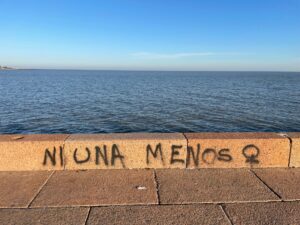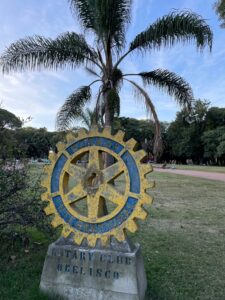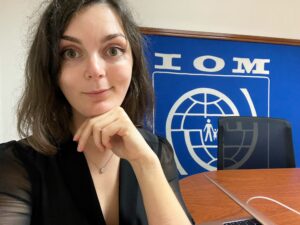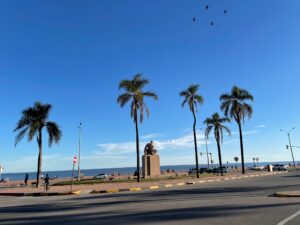From Scarlett: Innovation, Resource Mobilization and La Vida Mejor – An Applied Field Experience in Uruguay
I’m not going to say North Carolina barbecue was the main incentive, but it wasn’t not part of my reasoning. Applying for the Rotary Peace Fellowship is thrilling enough, but when each Peace Center is housed in a sensational university that is itself situated in a vibrant country, the “pros and cons” list which determined which university I would prioritise started to wade into some particularly exhaustive criteria.
I decided to dream big and selected the Duke-University of North Carolina (UNC) Peace Center. As soon as I clicked “send” on my application, I hoped I had made the right choice – or rather, that my moonshot had the force behind it to clear the home stretch. This Center, the only one in the world divided across two world-class universities – is renowned for its competitive applicant pool. It would have been a cruel irony to squander my chance at a once-in-a-lifetime Fellowship because I felt compelled to find my footing in the fierce rivalry between Eastern or Lexington-style barbecue.
In the spirit of the adage “when it rains, it pours”, I was accepted into the Rotary Peace Fellowship just as my career in the United Nations system was starting to gain momentum. This is a not-uncommon occurrence for many of the mid-tier professionals who become Rotary Peace Fellows: We apply, inspired by the academic and professional development opportunities promised by this life-changing fellowship, but acutely aware that we are being evaluated against many incredible, equally-deserving candidates from around the world. And sometimes we begin to pre-emptively prepare ourselves for the possibility that we won’t be selected. “My career is going well,” we start to think, “Maybe it’s okay if I don’t get in.”
Then the acceptance email arrives, and euphoria takes over. Suddenly everything is about to change, and it is terrifying and exhilarating and brilliant.
I arrived at the Duke-UNC Peace Center on a sticky summer day and was at once reminded of how lucky I was as each of Fellows from Class 19 and 20 introduced themselves. Unsurprisingly, each was as capable and passionate as the next. I silently promised myself, for what might have been the thousandth time since the fateful day the acceptance email pinged into my inbox, that I would make the most of every element of the Fellowship and embrace every opportunity I encountered to push myself, to be challenged, and to grow. And over the course of the first year, it did: My thesis idea crystallized rapidly and I became a Research Assistant in the Gillings School of Public Health on a project focused on developing a survivor-centered restorative justice model for domestic violence intervention programs. But there was still the question of how I would spend my first summer of the Rotary Peace Fellowship.
The Applied Field Experience (AFE) is a three-month summer internship which takes place after the first year. It is an opportunity for Rotary Peace Fellows to gain professional experience in an area related to their individual academic and professional journey. From the beginning, I was so excited to find out what my AFE might entail. I knew I wanted to further consolidate my work United Nations, but there were so many ways to go about it; how could I possibly decide?
The alumni of the Rotary Peace Fellowship ended up informing my decision. In a virtual panel about maximizing the Fellowship for career progression, one panelist encouraged incoming Fellows to seek AFEs where they could play a larger role in a small team and contribute definitively to a tangible outcome. Another advocated for Fellows to use the luxury of the AFE to step outside of their comfort zone. I decided to do both.
I had been a broke twenty-something when I met the Spanish man who would later become my husband, and so I’d been painstakingly teaching myself the language over a couple of years. I was decent enough, albeit informal and conversational… But I remained dogged by an embarrassing habit: Whenever I was addressed directly by a Spanish speaker, my face would shift to something akin to panic and my brain would scramble with upside-down question marks. I wondered if maybe the AFE was the right opportunity to not only overcome this mental hurdle, but also professionalize my Spanish competency to enable the possibility of living and working in Latin America in the future. I’d long poked fun at my propensity to cheerfully mangle the Spanish language, but the AFE felt like a chance to change that – and continue supporting the work of the United Nations somewhere totally different from my previous experiences.
I underwent two multi-person interview panels with key members of the Uruguay country office of the International Organization for Migration (IOM), the UN Migration agency, where, by some miracle, my enthusiasm and experience somehow outweighed the occasional blip in vocabulary. Soon thereafter came my first day at the office, which overlooked Montevideo’s famous Plaza Independencia. As Policy and Liaison Intern, I would work directly with the Chief of Mission in close collaboration with 30-something colleagues across three offices.
Uruguayans have a reputation for being warm and welcoming, and my colleagues were no exception – including the expatriate staff. I soon learned there was an unspoken, but unwavering, practice of colleagues winding through the office several times a morning, trying to ply one another with chocolates or delicious home-baked goods as they discussed the latest developments in a recent project or an interesting report from a partner. Nobody seemed to mind as I meekly asked if they could maybe speak just a little slower, por favor and muchas gracias. After a couple of weeks, I began to find that I didn’t need to ask anymore
I had no delusions about the level of responsibility I might have as intern – after all, I had come to the Southern Cone to learn – so it was a welcome surprise to be assigned the exact kind of rich and meaningful project I’d hoped to be involved in, even tangentially. I was made responsible for the development, implementation and coordination of IOM’s national Innovation and Resource Mobilization Strategy, which included developing the capacity development tools for colleagues to strengthen their technical skills in context analysis, stakeholder engagement and project design; as well as interpersonal skills which might assist in building rapport with diverse stakeholders, diplomatic liaison, and pitching and negotiation.

The development of the strategy has been a wonderful opportunity to develop a nuanced understanding of the migration context in Uruguay, a country of relatively high standards of social and economic development. IOM Uruguay is a strong agency with a great deal of knowledge to share with other partners, agencies and IOM country offices, both in the region and beyond. As such, the Innovation and Resource Mobilization Strategy is a vehicle to support knowledge sharing from IOM Uruguay, while also providing an interdisciplinary capacity development opportunity for IOM staff with creative enthusiasm in the realm of project development.
In the coming weeks, we will hold the Innovation and Resource Mobilization working group’s inaugural capacity development workshop, and I couldn’t be more excited. The time has been flying by, but this AFE has delivered everything I could have hoped for, and much that I had not anticipated.
After this rich professional experience, I imagine it will feel quite surreal to return to the U.S. and revert my attention to my thesis, but I doubt the transition will feel too abrupt when it finally comes. After all, I first came to North Carolina with a desire to feast on as much barbecue as I could. There is kind of narrative harmony to know that when I return there, it will be from Uruguay… Likely with the faint smoky scent of the parilla most likely still clinging to my clothes.



